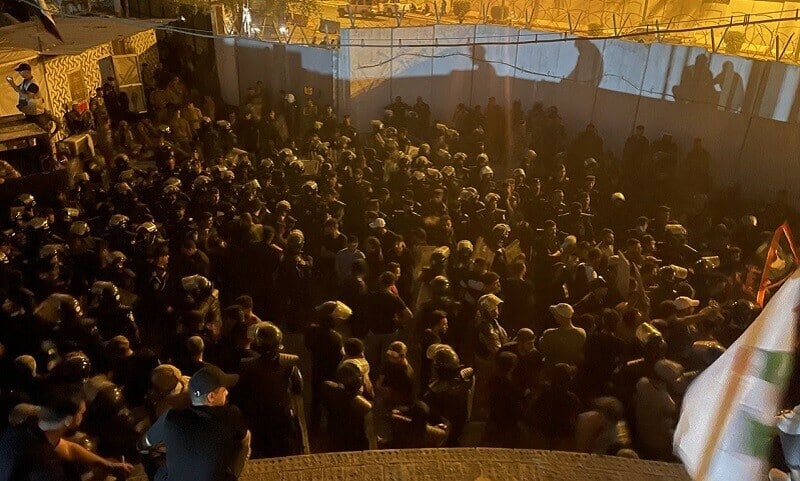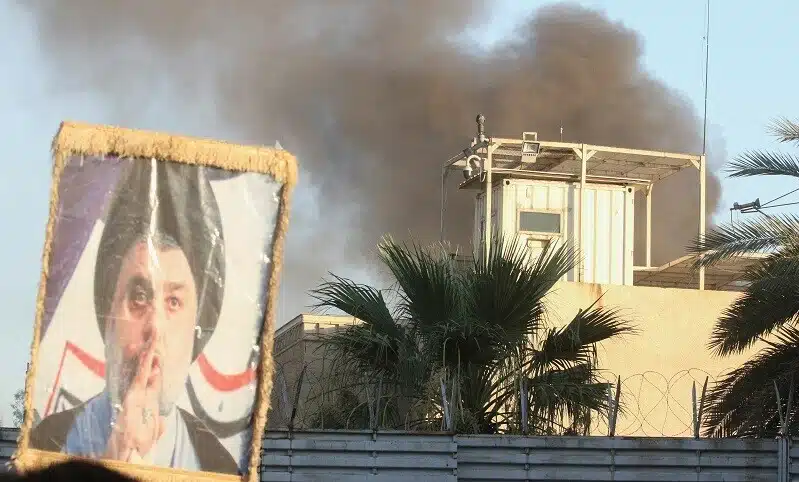Hundreds of protesters stormed the Swedish embassy in central Baghdad in the early hours of Thursday morning, scaling its walls and setting it on fire in protest against the expected burning of the Holy Quran in Sweden.
The Swedish foreign ministry press office issued a statement condemning the attack and emphasising the importance of diplomatic missions being safeguarded by Iraqi authorities. The statement also stated that all embassy personnel in Baghdad were safe.
In response to the second planned burning of the Holy Quran in Sweden in recent weeks, Shia cleric Muqtada Sadr’s supporters called for a protest on Thursday, according to posts in a well-known Telegram group connected to the influential cleric and other pro-Sadr media.
One of the most influential individuals in Iraq, Sadr commands hundreds of thousands of supporters, many of whom he has summoned to the streets at various times, most recently last summer when they occupied Baghdad’s heavily fortified Green Zone and engaged in deadly clashes.
Swedish news agency TT reported on Wednesday that Swedish police granted an application for a public meeting outside the Iraqi embassy in Stockholm on Thursday.
According to the application, the applicant wants to burn the Iraqi flag and the Holy Quran, TT reported.
People were seen assembling outside the embassy at around one in the morning on Thursday (2200 GMT on Wednesday), chanting pro-Sadr slogans, and storming the embassy complex at about one hour later, according to a series of videos posted to the Telegram group One Baghdad.
The Quran, yes, yes, the protesters shouted.
Later videos showed protesters standing on the roof of a building within the embassy complex as smoke rose from it. The authenticity of the videos could not be independently confirmed by Reuters.
Protests
The incident was denounced by the foreign ministry of Iraq, which also said in a statement that the Iraqi government had given security forces orders to conduct a prompt investigation, find the culprits, and hold them accountable.
Security personnel had been stationed inside the embassy by Thursday’s dawn, and smoke was rising from the structure as firefighters put out recalcitrant embers, according to witnesses interviewed by Reuters.
A few dozen protesters were still loitering outside the embassy after the majority of them had left.

After an Iraqi man burned the Holy Quran in Stockholm late last month, Sadr called for protests against Sweden and the expulsion of the Swedish ambassador.
The man was accused by Swedish police of inciting hatred against a national or ethnic group. He identified himself as an Iraqi refugee seeking to outlaw the Holy Quran in a newspaper interview.
In the wake of that burning, there were two significant demonstrations in front of the Swedish embassy in Baghdad, with demonstrators once entering the embassy’s grounds.
Several Muslim nations, including Iraq, Turkey, the United Arab Emirates, Jordan, and Morocco, have expressed their outrage over the incident, with Iraq calling for the man’s extradition so that he can stand trial there.
The United States also condemned it, but added that Sweden’s issuing of the permit supported freedom of expression and was not an endorsement of the action.
Similarly, Pakistan had also strongly condemned the “despicable act” of the desecration of the Holy Quran.
The Foreign Office had stated that such intentional incitement to discrimination, hatred, and violence cannot be justified under the pretext of freedom of expression and protest.
“Under international law, states are duty-bound to prohibit any advocacy of religious hatred, leading to the incitement of violence,” it stated.
The FO had urged the international community and the national governments to undertake “credible and concrete measures to prevent the rising incidents of xenophobia, Islamophobia and anti-Muslim hatred”.
Following days of protests, the Swedish police granted permission for a demonstration that included burning holy texts outside the Israeli embassy in Stockholm, drawing condemnation from Israel and Jewish organisations.
As a counterprotest to the protest of burning the Holy Quran, the demonstration originally called for burning the Torah and the Bible. It was described as an expression in favour of free speech in the police application.
However, a day later, the organiser of the protest announced that he would not proceed with it.
He had explained that his intention was in fact to denounce those who burn sacred books such as the Holy Quran in the Nordic country.
“This is a response to the people who burn the [Holy] Quran. I want to show that freedom of expression has limits that must be taken into account,” the Swedish resident of Syrian origin had said.






